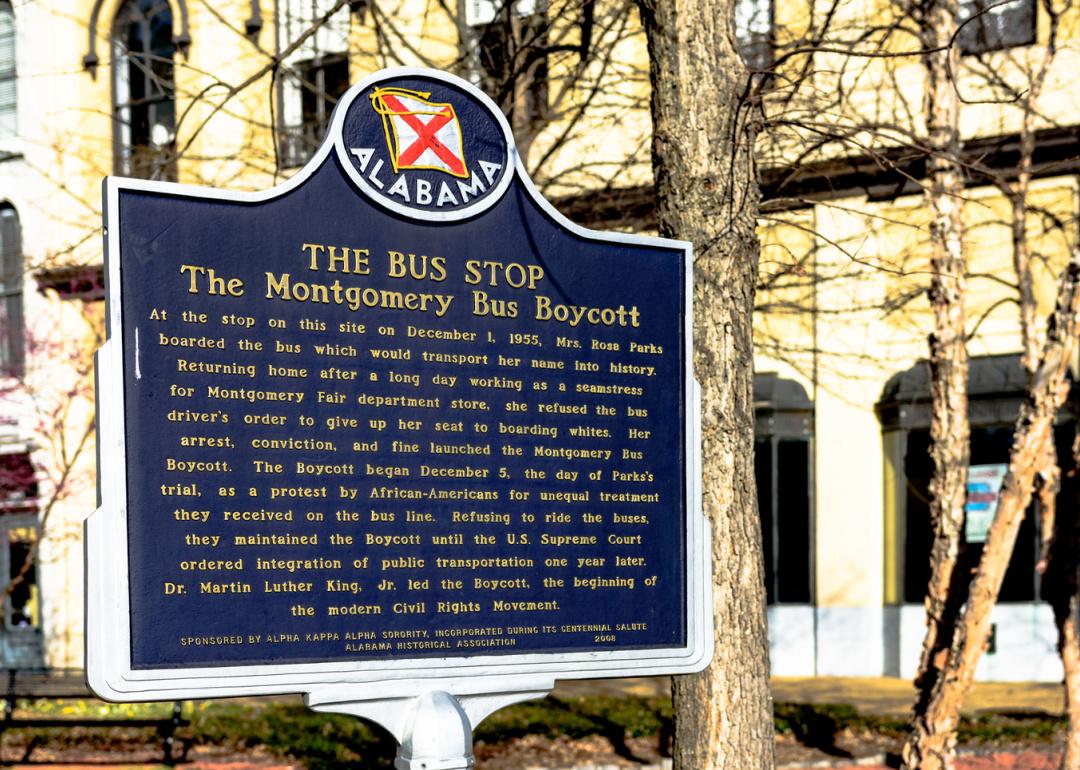
Explore historic sites commemorating Black history in Illinois
Explore historic sites commemorating Black history in Illinois
The legacies of influential Black Americans have not always been acknowledged, so it's not uncommon that modern-day residents may overlook the historic sites of their own cities.
While some historical Black figures in the U.S. are more well-known than others, there are in fact thousands of people dating back generations to 17th-century slavery who left traces of their visions and impacts all across the country. Whether prominent figures such as Robert Abbott, who founded one of the largest African American newspapers in the country, or more under-the-radar originators such as Obrey Wendell Hamlet, who cultivated unique vacation experiences in the Rocky Mountains, one thing's for certain: There is far more uncharted Black history in this country than charted.
Stacker identified historic sites commemorating Black history across 47 states, using the National Register of Historic Places. North Dakota, Vermont, Hawaii, and Wyoming did not have Black historic sites listed on the registry. While some states, especially in the South, are home to many sites central to the civil rights movement, Stacker listed the total sites in every state and the names of three historic sites where available. You can visit the full registry of 232 historic sites and explore the Civil Rights Trail to learn about additional locations across the U.S.
Read on to explore and learn about the historic sites celebrating Black history in your state, or read the national story here.
Illinois by the numbers
- Sites commemorating Black history: 18 (1 with state significance, 8 with national significance)
- Lovejoy, Owen, Homestead (Princeton)
- Robert S. Abbott House (Chicago)
- Oscar Stanton De Priest House (Chicago)
Built in 1838 in Princeton, Illinois, the Owen Lovejoy Homesstead was the home of the congressman, attorney, and abolitionist Owen Lovejoy. The home was a former station of the Underground Railroad and consists of a secret compartment that hid enslaved people who escaped.
Continue reading to see which sites commemorate Black history in other states in your area.
Indiana
- Sites commemorating Black history: 37 (7 with state significance, 1 with national significance)
- Walker, Madame C. J., Building (Indianapolis)
- Alexander Taylor Rankin House (Fort Wayne)
- Eleutherian College (Lancaster)
A Black woman entrepreneur, activist, and philanthropist, Madam C.J. Walker is recognized widely as the first self-made female millionaire in the U.S. due to the achievements of her cosmetology empire. Walker created specialized hair care products for Black women after experiencing a scalp ailment that resulted in her own hair loss. The Madame C.J. Walker Building, located at 617 Indiana Ave. in Indianapolis, was built in 1927 and provides guided tours to this day.
Iowa
- Sites commemorating Black history: 14 (4 with state significance, 1 with national significance)
- Fort Des Moines Provisional Army Officer Training School (Des Moines)
- Iowa Federation Home for Colored Girls (Iowa City)
- Buxton Historic Townsite (Lovilia)
Although Buxton was a multiethnic community, the then-bustling coal-mining town had a large, growing Black population. Buxton Historic Townsite, founded in 1895, is named after Benjamin Buxton, who was the president of the Consolidation Coal Company. After World War I, train engines converted to using diesel fuel, and as a result, there was a decrease in demand for coal. Severe fires damaged the mines, many of the residents moved, and as a result, this caused the rapid demise of the once-thriving community.



